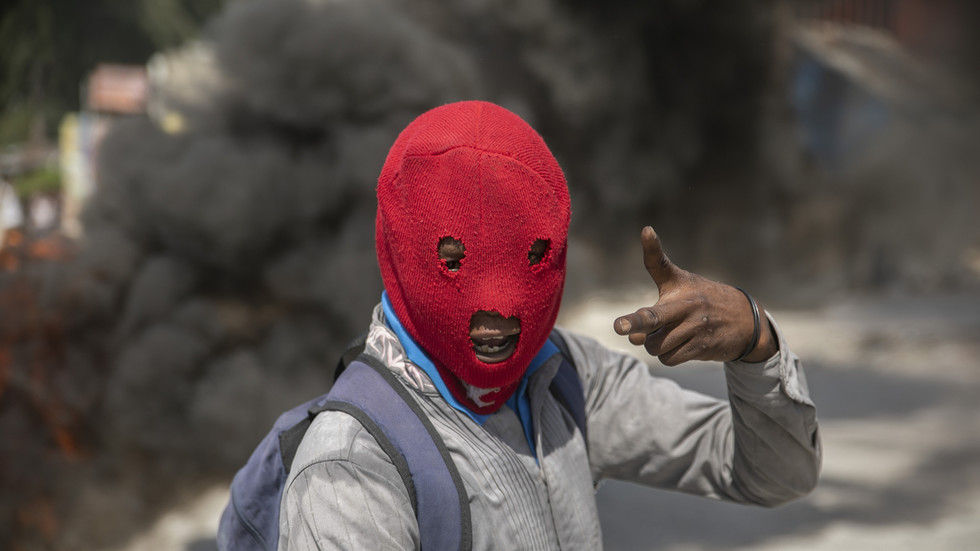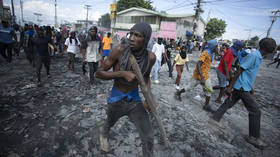
Washington said the operation would be “limited” and seek to quell unrest and gang violence on the island

A protester gestures next to a burning tire during a demonstration against a requested foreign military deployment, in Port-au-Prince, Haiti, October 17, 2022. © AP / Odelyn Joseph
The United States has proposed a security assistance mission in Haiti, calling on foreign partners to contribute personnel and equipment to help end violent anti-government protests, which have blocked off some of the country’s main ports and caused major shortages in key goods.
United Nations envoy Linda Thomas-Greenfield floated the idea to the body’s Security Council on Monday, citing a “dire” humanitarian crisis currently raging in Haiti and a “deteriorating security situation.” Though she said the project would not directly involve UN peacekeepers, Thomas-Greenfield voiced hopes that member states would provide the necessary resources for the mission.
Alongside Mexico, the US proposed two resolutions for Haiti, the first calling to impose international sanctions on “criminal actors,” individuals responsible for “gang violence” and protesters deliberately “blocking Haiti’s ports and the delivery of humanitarian assistance to the Haitian people.”
The second measure would authorize a “non-UN international security assistance mission to help improve the security situation and enable the flow of desperately needed humanitarian aid,” Thomas-Greenfield said, adding that the move would fulfill a recent request for a foreign troop deployment by Haitian PM and President Ariel Henry.

With a long and often violent history of US intervention in the country, many Haitians have objected to any Western troop deployment or peacekeeping operation, with some protesters seen waving Russian flags and even hoisting signs urging Moscow to send troops to deal with ongoing chaos in the streets. Russia appears unlikely to heed such requests, with its deputy UN envoy Dmitry Polyansky saying the body should “thoroughly weigh all consequences” before “meddling in the political processes in Haiti.”
Haiti has seen intense civil disturbances in recent weeks, with large groups of demonstrators descending upon the country’s primary fuel terminal to protest a recent cut to government gas subsidies last month. Since then, protesters and gang members – some of them armed – have effectively blockaded the port, crippling distribution of needed goods and aid while forcing the closure of countless businesses and other institutions, including three-quarters of Haiti’s hospitals, according to the United Nations.
While Thomas-Greenfield provided few details about the proposed mission, she said it would help the Haitian National Police and Coast Guard to “improve the security situation on the ground,” voicing hopes that it would facilitate the distribution of humanitarian aid.
The UN envoy noted that Washington and Ottawa had already sold “tactical and armored vehicles and other supplies” to Haiti in recent days, saying they would be used to “counter gang violence,” but suggested the supplies were not enough.
The small Caribbean island has been plagued by unrest since the assassination of President Jovenel Moise last year, seeing a spike in kidnappings, riots, looting and other forms of gang violence. Henry took over as both interim PM and president soon after Moise’s death, though even as protesters insist he step down, the chances for a new election appear unlikely anytime soon.




